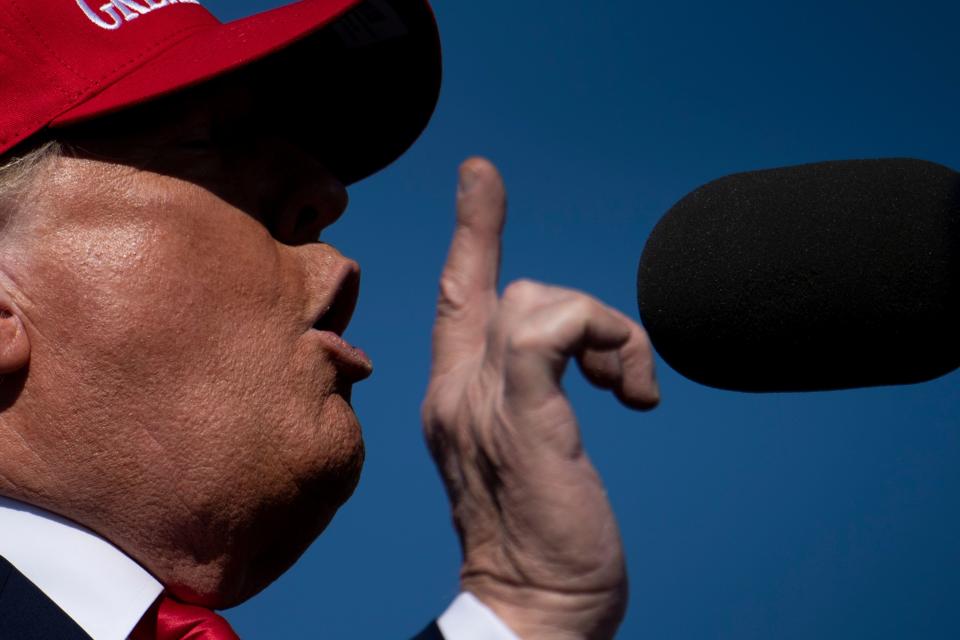Trump's vaccine promises meet reality
President Trump’s optimistic promises that a vaccine for COVID-19 would be ready either before the election or by the end of the year seem increasingly unlikely to be fulfilled.
In a Wednesday interview with the Journal of the American Medical Association, Dr. Anthony Fauci adjusted the administration’s timeline for when a vaccine would be ready.
“Could be January, could be later. We don’t know,” Fauci, the leading expert on infectious diseases on the president’s coronavirus task force, said.
In early October, shortly after he was treated for his own COVID-19 infection at Walter Reed medical center, Trump repeatedly said on the campaign trail that “vaccines are coming momentarily.” But when pharmaceutical manufacturer Pfizer announced on Oct. 16 that it would delay applying to the Food and Drug Administration for emergency authorization to distribute the vaccine it was developing, Trump softened his declarations, saying a vaccine would be coming “within weeks.”
On a corporate earnings call on Tuesday, Pfizer revealed it had so far been unable to conduct an analysis of a phase III clinical trial to determine whether its vaccine is safe and effective, STAT reported. Without that analysis, the FDA will not grant an emergency use authorization.
“I can tell you our decision at FDA will not be made on any other criteria than the science and data associated with these clinical trials,” FDA Director Stephen Hahn told CBS News in September.
He was responding to accusations from the president days earlier that the FDA had been coopted by the “deep state,” delaying the release of a vaccine so as to hurt his reelection chances.
The deep state, or whoever, over at the FDA is making it very difficult for drug companies to get people in order to test the vaccines and therapeutics. Obviously, they are hoping to delay the answer until after November 3rd. Must focus on speed, and saving lives! @SteveFDA
— Donald J. Trump (@realDonaldTrump) August 22, 2020
The clash prompted Health and Human Services Secretary and Trump loyalist Alex Azar to seek to have the FDA director replaced, Politico reported.
But Trump’s assertion that a vaccine could be ready by Nov. 3 was always improbable. While Operation Warp Speed has made notable initial progress in the production of a vaccine, reality has set in over recent weeks, as manufacturers like AstraZeneca and Johnson & Johnson were forced to pause their vaccine trials after participants became ill.

Such setbacks are common in vaccine development and don’t necessarily mean that the compound being tested caused the illness, but researchers have to investigate to rule it out.
Health experts have always known that the odds were long that a vaccine could be available for the public by the end of the year. When he testified before Congress in mid-September, Centers for Disease Control and Prevention Director Robert Redfield said a vaccine would not be widely available until late spring or early summer of next year.
“If you’re asking me when it is going to be generally available to the American public so we can begin to take advantage of a vaccine to get back to our regular life, I think we’re probably looking at late second quarter, third quarter 2021,” Redfield said, a prediction that Trump felt it necessary to correct.
“I think he made a mistake when he said that,” Trump said at a testy White House press conference the next day. “It’s just incorrect information, and I called him and he didn’t tell me that, and I think he got the message maybe confused — maybe it was stated incorrectly.”
Trump’s optimism rests on his plan to enlist the U.S. military to distribute the vaccine, which in turn assumes that a safe and effective product is available.
“We have a vaccine that’s coming, it’s ready,” Trump said during the final presidential debate. “It’s going to be announced within weeks, and it’s going to be delivered. We have Operation Warp Speed, which is the military, is going to distribute the vaccine.”
But Trump’s own military officials may not be on board with this plan.
“Our best military assessment is that there is sufficient U.S. commercial transportation capacity to fully support vaccine distribution,” Charles Pritchard, a spokesman for the Department of Defense, said in an interview in late September. “There should be no need for a large commitment of DOD units or personnel to support the nationwide distribution of vaccines.”
To date, COVID-19 has killed more than 228,000 Americans and infected more than 8.9 million people in the U.S. The pandemic is worsening, with new cases rising across the country by 41 percent over the last 14 days. Over the last 24 hours alone, 81,457 new cases and 1,016 deaths from COVID-19 were reported in the U.S.
Phase III vaccine trials are ongoing, and it is conceivable that a company could approach the FDA in the weeks following the election seeking an emergency use authorization. Even so, that doesn’t mean a vaccine will be granted approval before the end of the year, or that, if it is, it will be available to most Americans until after the “dark winter” that Trump’s opponent, Joe Biden, says is coming.
_____
Read more from Yahoo News:

 Yahoo Movies
Yahoo Movies 


